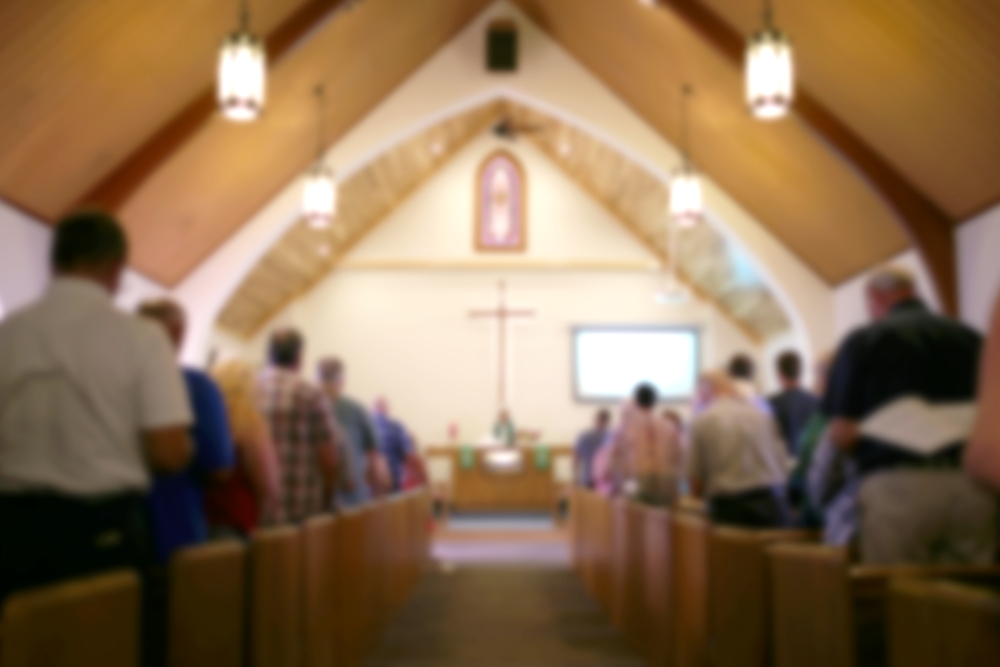
(© Christin Lola/Shutterstock)
In Sirobuja, on the outskirts of Split, a clandestine mass was held on the day of Catholic Easter, in spite of all the prohibitions imposed by the coronavirus epidemic. The journalists documenting the fact were beaten up and verbally abused
"Za dom spremni", "Journalists are worms", and then insults, threats, and beatings, all in the churchyard. Such scenes – scenes one would never want to see – were unfortunately recorded this Sunday near Split, right on Easter day.
The protagonist of the story is father Josip Delaš, controversial parish priest of Sirobuja, in the Split suburbs. Violating the ban imposed by the Croatian authorities on any public gathering of over 5 people to contain the current pandemic, father Delaš decided on Sunday to officiate a mass anyway. He announced it on Facebook, and around 10 in the morning he began to receive the first faithful.
This was not father Delaš' first "underground mass". A week earlier, on Palm Sunday, he had already attempted the same move, but he had been stopped by the police. On Easter Sunday, however, no agent showed up in Sirobuja, and therefore the priest was able to see his plan through.
In the middle of the morning, however, some local journalists arrived as well, also alerted by social networks. It was then that the priest and the faithful showed their best Easter spirit. In the live Facebook broadcast by Živana Šušak Živković of Dalmatinski portal, several people are seen entering the church, with one of them hitting the reporter's phone with a handful.
Another video, filmed by Ivana Sivro of TV N1, shows a similar scene: a person behind the wheel of a car approaches the journalist, who is filming from her car, and punches the camera.
Then there are images of scuffles right on the door of the church, with a journalist's hand crushed in the door and a smartphone thrown on the concrete. There are people who shout "If you publish this video, you will have problems!", and of course Father Delaš is there too, face purple, railing against journalists – not blasphemy, but close.
And it does not end there. To come full circle, a video filmed by the faithful and supporters of Father Delaš provides that pinch of nationalism that cannot be missed in such events.
Also in the churchyard, about twenty people gathered on Sunday afternoon, armed with Ustasha flag, smoke bombs, banner with the fascist slogan "For the country, ready!" (Za dom spremni), and a billboard in support of the parish priest reading "Journalists are worms", a phrase that has recently made several appearances in Dalmatia. In short, the complete Ustasha Easter kit.
Easter in review
On Monday, the Split police released a statement that sums up this day of fear and loathing in Sirobuja. Three people will have to answer for criminal charges for the attack on the two journalists, while a fourth person – a 70 year old – is accused of violating the epidemic containment measures.
Interior Minister Davor Božinović commented on the incident and condemned the attack on "a journalist who was trying to do her job", not to mention "in a church and during the most important Christian celebration". The mayor of Split, the president of the region, and even the archbishop of Split Marin Barišić repudiated the priest's behaviour.
"I apologise for the behaviour of our priest Josip Delaš. This morning's incident certainly does not contribute to the Christian celebration of Easter", said Barišić on Sunday afternoon. Yet, this was not enough to stop the rogue priest.
In the aftermath of the accident, Father Delaš was once again intent on saying mass in his churchyard for the usual handful of faithful. The latter were also not frightened by the fact that the day before the police had arrested 13 people for participating in the clandestine mass, including a minor – then informing the local social services of the incident. If Father Delaš and his circle have learned nothing from Sunday's events, what lessons can we learn from this Easter?
On the one hand, the Association of Croatian Journalists (HND) cannot but denounce once again "the open hunt for journalists" that takes place in Croatia, as HND President Hrvoje Zovko said in a statement.
"This is the third incident in Split in a matter of days and the victims are always journalists", explains Zovko, who speaks of "an atmosphere of lynching against journalists, considered guilty of everything". A concept, the latter, which in recent years "has been repeated by the highest representatives of the Church and government".
In short, condemning the events of Sirobuja "is not enough", and the HND expects state leaders to take concrete action on this matter.
On the other hand, the events expose the catastrophic state of the Croatian Catholic Church, trapped for years in a nationalist and ultra-conservative paranoia. "The events of Sirobuja showed the image of the Croatian Church", comments editorialist Tomislav Klauški on 24 Sata, "[an image] perhaps exaggerated, tragicomic, but still the image that the Catholic Church has maintained for years in the Croatian public space: close to thugs, Ustasha, and radicals; full of anger, hatred, and challenge; unbridled and hostile, repulsive and disgusting". "A Church – Klauški concludes – so far from the message of Pope Francis".
The newspaper Jutarnji List comes to the same conclusion interviewing sociologist of religions Ivica Maštruko, a former Yugoslav ambassador to the Vatican. "Archbishop Barišić could transfer Father Delaš to another parish", explains Maštruko. But he will not, because "they fear being involved in a political process and being labelled as 'Jugocommunists'".
What exactly it means to be a "Jugocommunist" in 2020 is not clear to everyone. But it certainly is to Father Delaš and his followers.
















 To Top
To Top